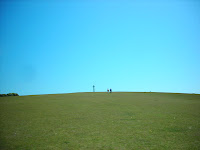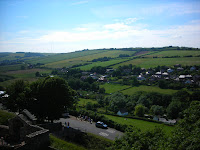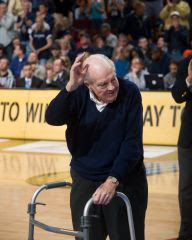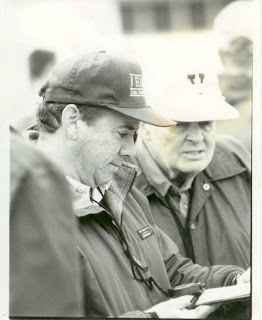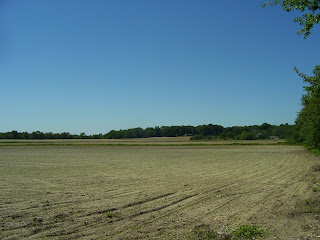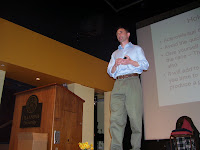
Donohue hopes to run down her Olympic dreams
By Sam Donnellon Philadelphia Daily News Sports Columnist
By Sam Donnellon Philadelphia Daily News Sports Columnist
IF YOU LIVE in Haddonfield, N.J., or its neighboring towns, you have likely seen Olympic hopeful Erin Donohue run. What you might not have seen - and you are far from alone - is the Olympic part of it, unless you were running alongside her.
At 5-7, 145 pounds, the 25-year-old Donohue looks more like the soccer striker or point guard that she was in her youth than the elite 1,500-meter runner she is now. She attacks the road more than glides above it.
"Kind of sloppy," is the way she describes it.
"Not that I have horrible form that's inefficient," she was saying in between morning and evening workouts yesterday. "But you go to track meets and see these runners who have beautiful form and they're just a beautiful thing to watch. But me - my shoulders kind of roll and my hands aren't always together and they kind of flop around and sometimes my head falls to the side . . . "
She says this with a smile. In high school, when she was winning state titles, her unconventional size and form were part of her allure. Both became less funny when she struggled through her first few years at the University of North Carolina, and became downright annoying when she finished up a strong senior season with a fourth in the 2005 NCAA championships - and found no agent interested in handling her, no shoe company seeking to sponsor her.
With a time of 4 minutes, 14.57 seconds in that meet, the much-held perception was that she had peaked. "I felt I had more, though," she said. "Much more. I felt I hadn't come close to maxing my potential."
It's the added weapon that often elevates athletes into the elite level, that self-belief. Donohue had been a fine runner in college, an ACC champion and four-time All-America. But there was little evidence to support her feeling of great, untapped potential.
Even to her. "Sometimes I did feel in college, when I was getting beat pretty badly sophomore and junior year, that I might be delusional," she said.
"But I think that's one thing that has helped me to train for as long as I have. Making that transition from high school to college and then the pro level, it's hard to keep that confidence all the way through. When people start getting beat, a lot just kind of give up on themselves. Even when I was getting beat by people in college, I still always thought I was good, and that it was just a temporary thing that I was getting my [butt] kicked."
A business major in Chapel Hill, Donohue got a paid internship in Nike's marketing department after graduation and moved to its offices in Eugene, Ore. With her Olympic dream now reduced to a secret, she continued to run before and after work.
In the fall of 2005, she ran into distance runner Franklyn Sanchez in the company's weight room. A high-school friend of Donohue's Carolina teammate Shalane Flanagan, Sanchez put her in touch with longtime distance coach John Cook. Retired after a 19-year stint as George Mason's men's coach, Cook, 66, was already building a reputation for developing talented but unfulfilled female distance runners.
"Sanchez kept telling me, 'You have to talk to this girl, she's so tenacious,' " Cook said in the June edition of Running Times Magazine. "She'd be out at night running workouts alone with one of those mining lamps on her head, because the Nike track is pro-environmental, you know, and there are no lights. So I started going out to the track with a light on my head, so I could see her. The weather could be so horrendous, sometimes I'd hope she wouldn't show up. But she always did."
In 3 years since, Donohue's elaborate training program has enhanced the strengths of her sturdy frame - specifically her stamina and late explosiveness. Always capable of handling the grind, she has shaved off seconds from her times in both the 800 and her specialty, the 1,500. In her final tuneup last Sunday at the Prefontaine Classic in Oregon, Donohue finished fourth with a time of 4:07.65, the second American across the finish line.
With less than a month to go before the U.S. Olympic trials in Eugene, she is one of only four U.S. women to have qualified for the Olympic A standard with a time of under 4:07. Only those who have run under 4:07 are qualified to go, so she is likely to take one of the three spots on the U.S. team headed to Beijing in August.
Which is a pretty neat trick for a runner everyone forgot about 3 years ago, a runner who couldn't get an agent to return a call, couldn't get a sponsor, couldn't get anyone to look past the frame and the funky form and see an athlete who just wouldn't quit on herself.
"To be honest," she said. "I still think I have something to prove." *


